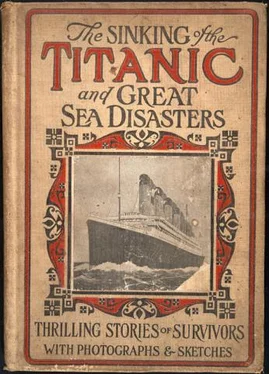Logan Marshall - Sinking of the Titanic and Great Sea Disasters
Здесь есть возможность читать онлайн «Logan Marshall - Sinking of the Titanic and Great Sea Disasters» весь текст электронной книги совершенно бесплатно (целиком полную версию без сокращений). В некоторых случаях можно слушать аудио, скачать через торрент в формате fb2 и присутствует краткое содержание. Год выпуска: 1912, Жанр: Прочая документальная литература, на английском языке. Описание произведения, (предисловие) а так же отзывы посетителей доступны на портале библиотеки ЛибКат.
- Название:Sinking of the Titanic and Great Sea Disasters
- Автор:
- Жанр:
- Год:1912
- ISBN:нет данных
- Рейтинг книги:4.5 / 5. Голосов: 2
-
Избранное:Добавить в избранное
- Отзывы:
-
Ваша оценка:
- 100
- 1
- 2
- 3
- 4
- 5
Sinking of the Titanic and Great Sea Disasters: краткое содержание, описание и аннотация
Предлагаем к чтению аннотацию, описание, краткое содержание или предисловие (зависит от того, что написал сам автор книги «Sinking of the Titanic and Great Sea Disasters»). Если вы не нашли необходимую информацию о книге — напишите в комментариях, мы постараемся отыскать её.
’s demise!
Sinking of the Titanic and Great Sea Disasters — читать онлайн бесплатно полную книгу (весь текст) целиком
Ниже представлен текст книги, разбитый по страницам. Система сохранения места последней прочитанной страницы, позволяет с удобством читать онлайн бесплатно книгу «Sinking of the Titanic and Great Sea Disasters», без необходимости каждый раз заново искать на чём Вы остановились. Поставьте закладку, и сможете в любой момент перейти на страницу, на которой закончили чтение.
Интервал:
Закладка:
Mr. Ismay’s plans had been to return immediately to England, and he had wired that the steamer Cedric be held for himself and officers and members of the crew; but public sentiment and subpoenas of the Senate’s investigating committee prevented. In the face of the criticism aimed against him Mr. Ismay issued a long statement in which he not only disclaimed responsibility for the Titanic’s fatal collision, but also sought to clear himself of blame for everything that happened after the big ship was wrecked.
He laid the responsibility for the tragedy on Captain Smith.
He expressed astonishment that his own conduct in the disaster had been made the subject of inquiry. He denied that he gave any order to Captain Smith. His position aboard was that of any other first cabin passenger, he insisted, and he was never consulted by the captain. He denied telling anyone that he wished the ship to make a speed record. He called attention to the routine clause in the instructions to White Star captains ordering them to think of safety at all times. He did not dine with the captain, he said, and when the ship struck the berg, he was not sitting with the captain in the saloon.
The managing director added that he was in his stateroom when the collision occurred. He told of helping to send women and children away in life-boats on the starboard side, and said there was no woman in sight on deck when he and William E. Carter, of Bryn Mawr, Pa., entered the collapsible boat—the last small craft left on that side of the vessel. He asserted that he pulled an oar and denied that in sending the three messages from the Carpathia, urging the White Star officials to hold the Cedric for the survivors of the Titanic’s officers and crew, he had any intention to block investigation of the tragedy. Ismay asserted that he did not know there was to be an investigation until the Cunarder docked.
Mr. William E. Carter, of Bryn Mawr, who, with his family, was saved, confirmed Mr. Ismay’s assertions.
“Mr. Ismay’s statement is absolutely correct,” said Mr. Carter. “There were no women on the deck when that boat was launched. We were the very last to leave the deck, and we entered the life-boat because there were no women to enter it.
“The deck was deserted when the boat was launched, and Mr. Ismay and myself decided that we might as well enter the boat and pull away from the wreck. If he wants me, I assume that he will write to me.
“I can say nothing, however, that he has not already said, as our narratives are identical; the circumstances under which we were rescued from the Titanic were similar. We left the boat together and were picked up together, and, further than that, we were the very last to leave the deck.
“I am ready to go to Washington to testify to the truth of Mr. Ismay’s statement, and also to give my own account at any time I may be called upon. If Mr. Ismay writes to me, asking that I give a detailed account of our rescue I will do so.”
CHAPTER XXIII. THE FINANCIAL LOSS
SO great was the interest in the tragedy and so profound the grief at the tremendous loss of life that for a time the financial loss was not considered. It was, however, the biggest ever suffered by marine insurance brokers.
The value of the policy covering the vessel against all ordinary risks was $5,000,000, but the whole of this amount was not insured, because British and Continental markets were not big enough to swallow it. The actual amount of insurance was $3,700,000, of which the owners themselves held $750,000.
As to the cargo, it was insured by the shippers. The company has nothing to do with the insurance of the cargo, which, according to the company’s manifest, was conservatively estimated at about $420,000. Cargo, however, was a secondary matter, so far as the Titanic was concerned. The ship was built for high-priced passengers, and what little cargo she carried was also of the kind that demanded quick transportation. The Titanic’s freight was for the most part what is known as high-class package freight, consisting of such articles as fine laces, ostrich feathers, wines, liquors and fancy food commodities.
Prior to the sailing of the vessel the postal authorities of Southampton cabled the New York authorities that 3435 bags of mail matter were on board.
“In a load of 3500 bags,” said Postmaster Morgan, of New York, “it is a safe estimate to say that 200 contained registered mail. The size of registered mail packages varies greatly, but 1000 packages for each mail bag should be a conservative guess. That would mean that 200,000 registered packages and letters went down with the Titanic.
“This does not mean, however, that Great Britain will be held financially responsible for all these losses. There were probably thousands of registered packages from the Continent, and in such cases the countries of origin will have to reimburse the senders. Moreover, in the case of money being sent in great quantities, it is usual to insure the registry over and above the limit of responsibility set by the country of origin.
“Probably if there were any shipping of securities mounting up to thousands of dollars, it will be the insurance companies which will bear the loss, and not the European post-offices at all.”
In the case of money orders, the postmaster explained, there would be no loss, except of time, as duplicates promptly would be shipped without further expense.
The postmaster did not know the exact sum which the various European countries set as the limit of their guarantee in registered mail. In America it is $50.
Underwriters will probably have to meet heavy claims of passengers for luggage, including jewelry. Pearls of one American woman insured in London were valued at $240,000.
The Titanic and her valuable cargo can never be recovered, said the White Star Line officials.
“Sinking in mid-ocean, at the depth which prevails where the accident occurred,” said Captain James Parton, manager of the company, “absolutely precludes any hopes of salvage.”
In the life insurance offices there was much figuring over the lists of those thought to be lost aboard the Titanic. Nothing but rough estimates of the company’s losses through the wreck were given out.
The loss to the Carpathia, too, was considerable. It is, of course, the habit of all good steamship lines to go out of their way and cheerfully submit to financial loss when it comes to succoring the distressed or the imperiled at sea. Therefore, the Cunard line in extending the courtesies of the sea to the survivors of the Titanic asked for nothing more than the mere acknowledgment of the little act of kindness. The return of the Carpathia cost the line close to $10,000.
She was delayed on her way to the Mediterranean at least ten days and was obliged to coal and provision again, as the extra 800 odd passengers she was carrying reduced her large allowance for her long voyage to the Mediterranean and the Adriatic very much.
CHAPTER XXIV. OPINIONS OF EXPERTS
THE tremendous loss of life necessarily aroused a discussion as to the cause of the disaster, and the prevailing opinion seemed to be that the present tendency in shipbuilding was to sacrifice safety to luxury.
Читать дальшеИнтервал:
Закладка:
Похожие книги на «Sinking of the Titanic and Great Sea Disasters»
Представляем Вашему вниманию похожие книги на «Sinking of the Titanic and Great Sea Disasters» списком для выбора. Мы отобрали схожую по названию и смыслу литературу в надежде предоставить читателям больше вариантов отыскать новые, интересные, ещё непрочитанные произведения.
Обсуждение, отзывы о книге «Sinking of the Titanic and Great Sea Disasters» и просто собственные мнения читателей. Оставьте ваши комментарии, напишите, что Вы думаете о произведении, его смысле или главных героях. Укажите что конкретно понравилось, а что нет, и почему Вы так считаете.












